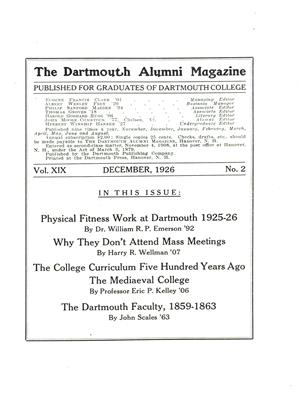For the alumnus interested more in Dartmouth victories than in Dartmouth games the 1926 football season was the most disappointing on record during the present century. For the first time since the season of 1900 a Dartmouth team lost four games—the four major games of its schedule. In that disastrous season of nearly a generation ago the Dartmouth team won games only from Exeter and Tufts, tied with Union and Vermont, and lost to Yale, Cornell, Wesleyan, and Brown. During the season just past Dartmouth lost to Yale, Harvard, Brown, and Cornell.
But this dreary looking record of the 1926 season will not bring acute melonchoha to the alumnus who can realize that in spite of the scores set down his Dartmouth team was clearly outplayed in only one of the eight games in its schedule,—the game with Yale. No Dartmouth man will begrudge Harvard her victory at Cambridge Oct. 23. Neither will he, however, admit that on that day the contingent from Hanover was outplayed. Similarly no Dartmouth man who witnessed the Brown game in Hanover, Oct. 30 left the stands feeling that the justly celebrated "iron men" had demonstrated any marked superiority over Captain Horton's players. And without detracting a whit, "or a jot, or a tittle, or what have you?, from the glory of Cornell's last minute victory no Dartmouth man could have left Ithaca, November 13, with his heart weighted by the thought that "the red terror" had proven itself any better than the Green.
All of this goes simply to prove that with football knowledge and football skill now almost equally distributed, as it is, throughout the larger colleges and universities of the country, the margin between defeat and victory has become very slight. The matter of a second or two in diagnosing a play, the honest but disastrous oversight of an official, a single error in judgment, or a slip of the fingers holding the ball, will account for the defeat of a team which has played as good football as its opponent and may have made no more errors.
It is not too much even to say that a victory over Yale might have given the 1926 Dartmouth team the minute added particle of sureness which would have enabled it to equal the record of the 1925 team; and, on the other hand, that an error and a consequent defeat at Providence a year ago might have prevented the 1925 team from vanquishing either Cornell or Chicago.
These are not times when any college football team can ride long on the crest of a wave of success unless in addition to all other requisites the team consistently is favored also by those things known as "the breaks of the game." Dartmouth, then, which since 1900 has played 222 games and lost but 40 and tied 14 of these, and which has gone through four seasons undefeated, in spite of the 1926 record has no reason to be downhearted.
Dedication of the Davis Varsity Field House Courtesy of the Pictorial
 View Full Issue
View Full Issue
More From This Issue
-
 Lettter from the Editor
Lettter from the EditorEditorial Comment
December 1926 -
 Article
ArticleALUMNI ASSOCIATIONS
December 1926 -
 Article
ArticleTHE COLLEGE CURRICULUM FIVE HUNDRED YEARS AGO THE MEDIEVAL COLLEGE
December 1926 By Professor Eric P. Kelly '06 -
 Article
ArticlePHYSICAL FITNESS WORK AT DARTMOUTH 1925-26
December 1926 By William R. P. Emerson, M. D. -
 Article
ArticleC. F. RICHARDSON'S TRIBUTE TO THE GREAT PRESIDENT
December 1926 -
 Article
ArticleWHY THEY DON'T ATTEND MASS MEETINGS
December 1926 By Harry R. Wellman '07
Sports
-
 Sports
SportsHOCKEY LEAGUE FORMED WITH SIX COLLEGES
December 1921 -
 Sports
SportsGYMNASIUM TEAM
APRIL, 1927 -
 Sports
SportsLast Month's Results
June 1948 -
 Sports
Sports1950 Varsity Football Roster
October 1950 By Bernard G. Sykes '51 -
 Sports
SportsFootball
November 1952 By Cliff Jordan '45 -
 Sports
SportsBlood, Sweat, and Tears
MARCH | APRIL 2021 By RALPH WIMBISH


